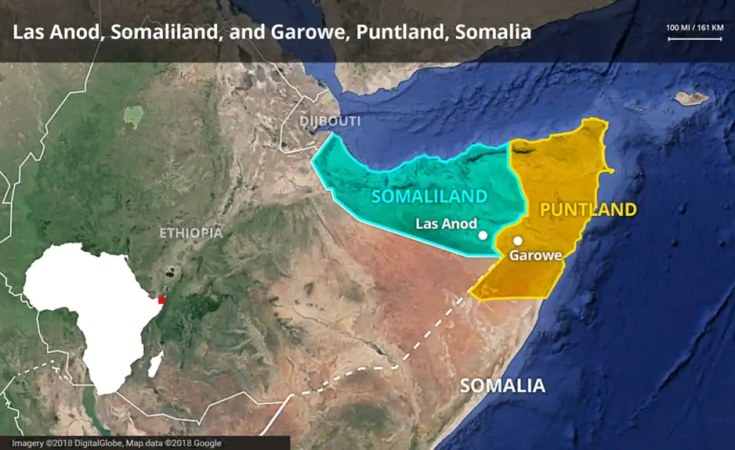Mogadishu, Somalia — Fighting in the area of Las Anod, in the breakaway Somaliland republic, has escalated, with medical sources now saying more than 100 people have been killed in three weeks of clashes.
Local militias are fighting to pull three regions away from Somaliland in order to rejoin Somalia. So far, calls for a cease-fire are being ignored.
Las Anod is the capital of the Sool region, which together with the Sanaag and Cayn regions is fighting to withdraw from Somaliland and be governed by Somalia to the south.
Dr. Abdimajid Husein Sugule told VOA that the five hospitals in the town were running out of medical supplies and bed space, as more injured and dead people were brought into the facilities each day.
He said this week that 105 people had been killed and 602 injured in the three weeks of fighting.
The U.N. and other diplomatic missions in the country have called for an end to the fighting, and so has Somalia's federal government. Despite these calls, shelling and gunfire have continued as both sides have dug trenches to defend their positions.
Somaliland President Muse Bihi announced last week that he would be dispatching clan elders to seek an end to the violence. However, clan elders in the battle-battered town demanded that Somaliland pull out its troops first as a precondition for dialogue.
A standoff
Abdiaziz Isaack, a security analyst with Hamad Bin Khalifa Civilization Center, a cultural and research organization, said it was unlikely that either side would back down on its demands for dialogue. He said that while the elders in Las Anod see the pullout of the Somaliland forces as critical for confidence building and lessening tensions, Somaliland on the other hand perceives a pullout as creating a vacuum, which could allow Puntland to return.
Somaliland captured the Sool region from Somalia's semiautonomous Puntland region and the two sides have been involved in deadly disputes since then.
Isaack said the only viable option for resolving the dispute was pressure from the international community.
He said Somali President Hassan Sheikh Mohamud's call for an end to the violence at the beginning of February had been met with silence. That, he said, left the international community as the only broker that could employ diplomacy and pressure to stop the fighting.
On Thursday, officials from the U.S. Embassy in Mogadishu visited Somaliland, where they condemned the fighting in Las Anod and called for a cease-fire.
Mohamed Ahmed, a security analyst at Nomad Development Enterprise, a security consultancy in Mogadishu, told VOA that rising international pressure could end the fighting soon.
But he added that Somaliland might not agree to withdraw its forces from Las Anod as a condition for talks because of possible domestic pressures faced by Bihi.
Bihi's term as president ended in November 2022, although he secured an additional two years from parliament.
Ahmed said Somaliland thinks a withdrawal from Las Anod could risk its control. Also, he said, Bihi, lacking a full mandate and political backup, likely fears that withdrawing Somaliland troops from Las Anod could draw criticism from the political opposition.
Aid agencies have warned the fighting could worsen an already fragile humanitarian situation, as the Horn of Africa battles a severe drought that the U.N. warns could degenerate into famine by midyear.


